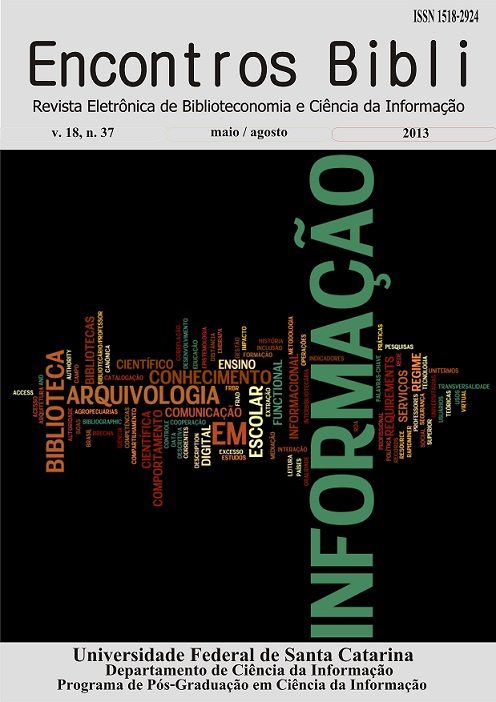A utilização do Resource Description and Access (RDA) na criação de registros de autoridade para pessoas, famílias e entidades coletivas
DOI:
https://doi.org/10.5007/1518-2924.2013v18n37p203Palabras clave:
Resource Description and Access (RDA), Controle de autoridade, Functional Requirements for Bibliographic Records(FRBR), Functional Requirements for Authority Data (FRAD), Catalogação descritiva, Informação e tecnologiaResumen
Considerando o desenvolvimento do Resource Description and Access (RDA) e a importância do controle de autoridade para os catálogos, objetiva apresentar o RDA, seu surgimento e desenvolvimento, contextualizar a criação de registros de autoridade na catalogação descritiva e apresentar a utilização do RDA no registro dos atributos e relacionamentos das entidades pessoa, família e entidade coletiva. Apresenta o RDA, sua relação com os modelos conceituais FRBR e FRAD, as seções, capítulos, atributos e relacionamentos definidos para pessoas, famílias e entidades coletivas. Por fim destaca algumas diferenças entre o RDA e o AACR2r e apresenta considerações sobre a implantação do RDA.
Descargas
Citas
BURGER, R. H. Authority work: the creation, use, maintenance, and evaluation of authority records and files. Littleton: Libraries Unlimited, 1985.
CHAN, L. M. Cataloguing and classification: an introduction. 2nd ed. New York: McGraw-Hill, 1994.
CLACK, D. H. Authority control: principles, applications, and instructions. Chicago: American Library Association, 1990.
CÓDIGO de catalogação anglo-americano. 2. ed., rev. 2002. São Paulo: FEBAB, 2004.
CUTTER, C. A. Rules for a dictionary catalog. 4th ed. rew. Washington, DC: Government Printing Office, 1904. Disponível em: <http://digital.library.unt.edu/ark:/67531/metadc1048/>. Acesso em: 31 maio 2012.
GRUPO DE TRABAJO SOBRE LOS REQUISITOS FUNCIONALES Y NUMERACIÓN DE REGISTROS DE AUTORIDAD. Requisitos funcionales de los datos de autoridad (FRAD): un modelo conceptual. Madrid: IFLA; Biblioteca Nacional de España, 2009. Disponível em: <http://www.ifla.org/files/cataloguing/frad/frad_2009-es.pdf>. Acesso em: 31 maio 2012.
IFLA STUDY GROUP ON THE FUNCTIONAL REQUIREMENTS FOR BIBLIOGRAPHIC RECORDS. Functional requirements for bibliographic records: final report. München: K. G. Saur, 2009. Approved by the Standing Committee of the IFLA Section on Cataloguing in September 1997. As amended and corrected through February 2009. Disponível em: <http://www.ifla.org/files/cataloguing/frbr/frbr_2008.pdf >. Acesso em: 31 maio 2012.
JOINT STEERING COMMITTEE FOR DEVELOPMENT OF RDA. Frequently asked questions. [S.l.], 2010a. Last updated: 18 January 2010. Disponível em: <http://www.rda-jsc.org/rdafaq.html>. Acesso em: 31 maio 2012.
JOINT STEERING COMMITTEE FOR DEVELOPMENT OF RDA. International Conference on the Principles and Future Development of AACR, Toronto, Canadá, 1997. Last updated: 1 July 2009. Disponível em: <http://www.rda-jsc.org/intlconf1.html>. Acesso em: 31 maio 2012.
JOINT STEERING COMMITTEE FOR DEVELOPMENT OF RDA. RDA: Resource Description and Access. [S.l.], 2010b. Disponível em: <http://www.rda-jsc.org/docs/rdabrochureJanuary2010.pdf>. Acesso em: 31 maio 2012.
LIBRARY OF CONGRESS. Library of Congress Long-Range RDA Training Plan for 2012 and Beyond. Washington, 2012. Disponível em: <http://www.loc.gov/aba/rda/pdf/RDA_Long-Range_Training_Plan.pdf>. Acesso em: 31 maio 2012.
MAXWELL, R. L. Maxwell’s guide to authority work. Chicago: American Library Association, 2002.
MORENO, F. P.; MÁRDERO ARELLANO, M. A. Requisitos funcionais para registros bibliográficos - FRBR: uma apresentação. Revista Digital de Biblioteconomia e Ciência da Informação, Campinas, v. 3, n. 1, p. 20-38, jul./dez. 2005. Disponível em: <http://www.sbu.unicamp.br/seer/ojs/index.php/sbu_rci/article/view/317>. Acesso em: 31 maio 2012.
REITZ, J. M. Online dictionary for library and information science. Last updated March 9, 2010. Santa Barbara: Libraries Unlimited, 2012. Disponível em: <http://lu.com/odlis/>. Acesso em: 31 maio 2012.
RESOURCE description and access (RDA). In: RDA Toolkit. Chicago: American Library Association; Ottawa: Canadian Library Association; London: Chartered Institute of Library and Information Professionals, 2012. Disponível em: <http://access.rdatoolkit.org>. Acesso em: 31 maio 2012.
STATEMENT of International Cataloguing Principles. [S.l.]: IFLA, 2009. Disponível em: <http://www.ifla.org/files/cataloguing/icp/icp_2009-en.pdf>. Acesso em: 31 maio 2012.
STATEMENT of principles adopted by the International Conference on Cataloguing Principles, Paris, October 1961. [S.l.: s.n], 1961. Disponível em: <http://www.d-nb.de/standardisierung/pdf/paris_principles_1961.pdf>. Acesso em: 26 mar. 2011.
U.S. RDA TEST COORDINATING COMMITTEE. Report and recommendations of the U.S. RDA Test Coordinating Committee. Washington: Library of Congress, 2011. Disponível em: <http://www.loc.gov/bibliographic-future/rda/source/rdatesting-finalreport-20june2011.pdf>. Acesso em: 31 maio 2012.
Descargas
Publicado
Cómo citar
Número
Sección
Licencia
Derechos de autor 2013 Fabrício Silva Assumpção, Plácida Leopoldina V. A. C. Santos

Esta obra está bajo una licencia internacional Creative Commons Atribución 4.0.
El autor debe garantizar:
que existe un consenso total de todos los coautores para aprobar la versión final del documento y su presentación para su publicación.
que su trabajo es original, y si se han utilizado el trabajo y / o las palabras de otras personas, estos se han reconocido correctamente.
El plagio en todas sus formas constituye un comportamiento editorial poco ético y es inaceptable. Encontros Bibli se reserva el derecho de utilizar software o cualquier otro método para detectar plagio.
Todas las presentaciones recibidas para su evaluación en la revista Encontros Bibli: revista electrónica de biblioteconomía y ciencias de la información pasan por la identificación del plagio y el auto-plagio. El plagio identificado en los manuscritos durante el proceso de evaluación dará como resultado la presentación de la presentación. En el caso de identificación de plagio en un manuscrito publicado en la revista, el Editor en Jefe llevará a cabo una investigación preliminar y, si es necesario, la retractará.
Esta revista, siguiendo las recomendaciones del movimiento de Acceso Abierto, proporciona su contenido en Acceso Abierto Completo. Por lo tanto, los autores conservan todos sus derechos, permitiendo a Encontros Bibli publicar sus artículos y ponerlos a disposición de toda la comunidad.
Los contenidos de Encontros Bibli están licenciados bajo Licencia Creative Commons 4.0.

Cualquier usuario tiene derecho a:
- Compartir: copiar, descargar, imprimir o redistribuir material en cualquier medio o formato
- Adaptar: mezclar, transformar y crear a partir del material para cualquier propósito, incluso comercial.
De acuerdo con los siguientes términos:
- Atribución: debe otorgar el crédito apropiado, proporcionar un enlace a la licencia e indicar si se han realizado cambios. Debe hacerlo bajo cualquier circunstancia razonable, pero de ninguna manera sugeriría que el licenciante lo respalde a usted o su uso.
- Sin restricciones adicionales: no puede aplicar términos legales o medidas tecnológicas que restrinjan legalmente a otros de hacer cualquier cosa que permita la licencia.



























